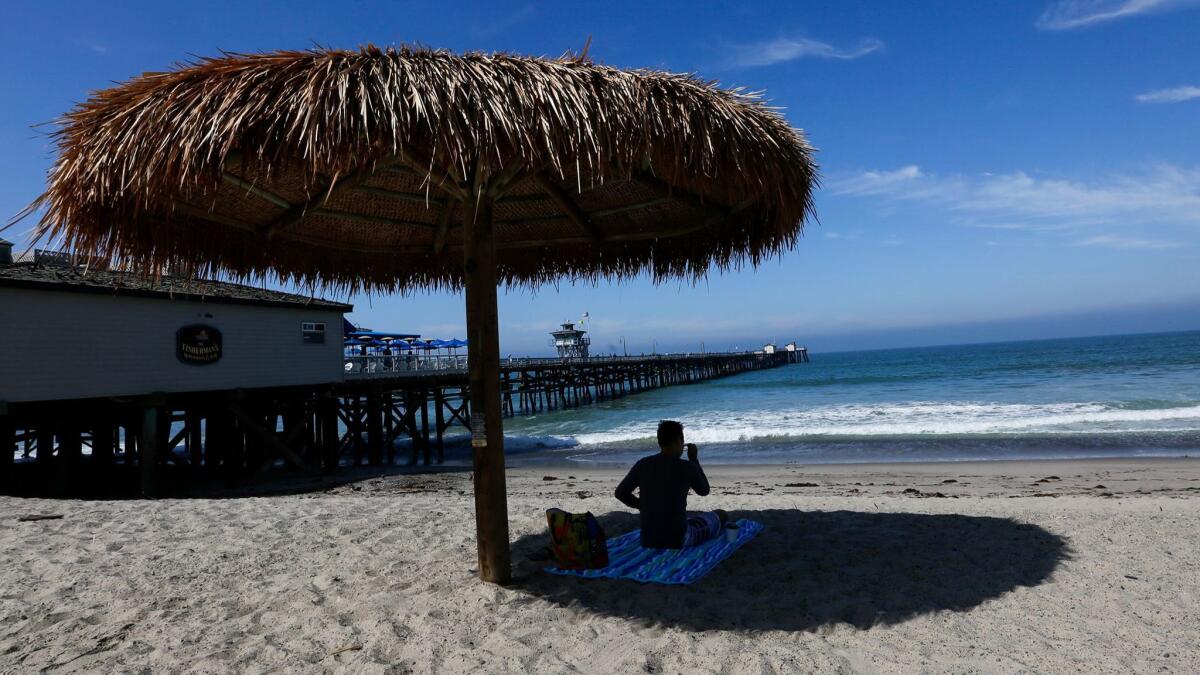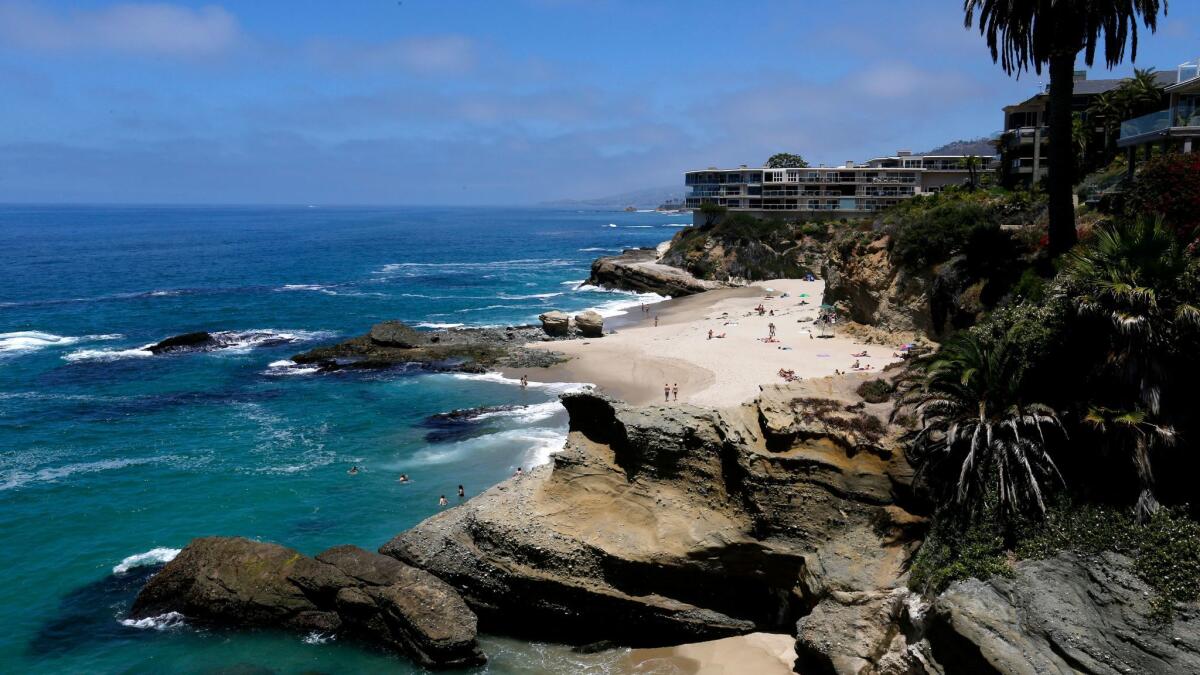Bummer: Report card says some Southern California beaches might make you sick

- Share via
Heavy rains last winter poured billions of gallons of polluted runoff into the ocean, significantly increasing health risks at many Southern California beaches, according to Heal the Bay’s annual beach report card.
“The reassuring news,” said Sarah Sikich, the environmental group’s vice president, “is that if you swim at an open-ocean beach in the summer away from storm drains and creek mouths, you statistically have very little risk of getting ill.”
No local beaches received failing marks from April to October 2016, the summer reporting period.
Released Thursday, the annual survey of beaches statewide showed that almost half the 85 beaches that Los Angeles County monitored last year earned F grades during the wet winter.
Report: Almost half of L.A. County beaches receive Fs »
High bacteria counts presented a significant health threat to thousands of regular ocean users, who were at risk of contracting such ailments as stomach flu, ear infections, upper respiratory infections and rashes from a morning swim or surf session, the report said.
Heal the Bay, based in Santa Monica, also found that bacterial levels spiked at some of California’s most popular beaches as polluted runoff poured through storm drains and into the sea.
“We want people catching waves, not bugs, when they head to the beach,” Sikich said.
Southern California accounted for five sites that made Heal the Bay’s infamous Beach Bummer List, which ranks the 10 most polluted beaches in the state.
Heal the Bay’s “Top 10 Beach Bummers”
- Clam Beach County Park, McKinleyville, Humboldt County: F
- San Clemente Pier, San Clemente: F
- Cowell Beach, West of Wharf, Santa Cruz: F
- Lakeshore Park, Marina Lagoon, San Mateo: F
- La Jolla Cove, La Jolla: D
- Santa Monica Pier: D
- Capitola Beach, Capitola, Santa Cruz County: D
- Luffenholtz Beach, Trinidad, Humboldt County: D
- Mother's Beach, Marina del Rey: D
- Monarch Beach, north of Salt Creek, Dana Point: D
Source: Heal the Bay
San Clemente Pier, a newcomer to the list, was in the No. 2 spot. Though shark sightings have closed stretches of this beach recently, swimmers might be more worried about bacteria levels.
La Jolla Cove in San Diego, another new addition to the top 10, was in fifth place. This beach sits in an enclosed area with limited water circulation.
The No. 6 slot belongs to Santa Monica Pier, where moist conditions, flocks of birds and storm drain runoff are likely culprits.
Efforts are underway to improve water quality, including the construction of a $1.6-million cistern system to catch runoff during the rainy season.
Mother’s Beach in Marina Del Rey is No. 9. Unsafe levels of bacteria have resulted from a lack of water circulation.
Monarch State Beach in Orange County was in 10th place. This bird-heavy stretch of sand north of Salt Creek is adjacent to the five-star Ritz Carlton resort in Dana Point.

In Los Angeles County, Heal the Bay analysts gave grades of A to F to 85 beaches for three testing periods in the 2016-17 report, based on levels of weekly bacterial pollution measured by health agencies.
Overall, about 93% of county beaches received A grades for the summer period, a 4% increase from last year’s report.
In Orange County, about 95% of 117 monitored beaches received A grades during the summer, while 40 beaches in Ventura County scored a perfect 100% for the seventh consecutive year.
San Diego County scored top marks, with 97% of 75 monitored sites receiving A or B grades during the summer. Wet weather grades declined, however, with only 68% of sites earning A or B grades during rains.
In addition, contaminated runoff from the Tijuana River at the Mexico border resulted in 21 beach closures. Despite encouraging news in dry weather, the report card states that stubborn pockets of chronic pollution still plague several popular beaches in that area.
Heal the Bay officials say that swimming or surfing at a beach with a water quality grade of C or lower greatly increases the risk of contracting respiratory or gastrointestinal illnesses.
They advise the public to avoid enclosed beaches with poor water circulation, wait three days before entering the ocean after rainfall and swim at least 100 yards from piers and storm drains.
On the positive side, four beaches in Los Angeles County made Heal the Bay’s Honor Roll, which recognizes beaches that score perfect A-plus grades year round. They are El Matador State Beach in Malibu, Malibu Point, Bluff Cove in Palos Verdes Estates and Portuguese Bend in Rancho Palos Verdes.
Orange County earned 14 spots on the Honor Roll, while Ventura had one.
Statewide, California’s overall water quality during summer was excellent.
About 97% of 416 beaches received A or B marks. During the rainy season, only 52% of beaches earned A’s and Bs.
Heal the Bay advocates reusing storm water runoff for non-potable uses or diverting it into aquifers rather than letting it flow out to sea.
The organization estimates that most of the 100 billion gallons of storm water that drenched the region last winter — enough to meet the needs of 2.5 million people — could have been captured and reused with the right drainage systems.
“We need to rethink how we handle storm water runoff,” Sikich said.
Heal the Bay officials also used their news conference for the report, which has become an annual publicity platform, to express concern about the Trump administration’s proposal to cut $3 billion from the
Sikich said this possible reduction, about a third of the agency’s total budget, would eliminate funding for ocean water monitoring programs in many California counties.
Los Angeles, which pays for its own water quality testing along the coast, would not be affected by the cuts in the EPA budget.
Follow me on Twitter @LADeadline16
ALSO
LAPD probing whether cadets stole and crashed two police cars, sources say
Victims of shooting at San Francisco UPS facility are identified as families and co-workers mourn
The report card on California’s battle against climate change
Sign up for Essential California
The most important California stories and recommendations in your inbox every morning.
You may occasionally receive promotional content from the Los Angeles Times.








